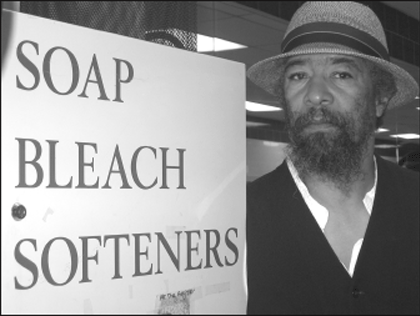By Audrey Tempelsman
Over the centuries, writers have met their muses in the most unlikely places: Marcel Proust discovered his in a buttery madeleine; Virginia Woolf, in her dog Pinka. And, since starting “Dirty Laundry: Loads of Prose/Fully Loaded” in 2005, East Village writer Emily Rubin has found her muse in laundromats.
“Now, when I’m walking down the street and I smell that wonderful mix of heat and detergent, I feel inspired,” she said, laughing.
Since the literary laundering’s inception, hundreds of writers, musicians and listeners have flocked to laundromats to participate in the quirky readings “where laundry and language spin together,” as Rubin puts it on her Web site, dirtylaundryreadings.com. The latest installment will take place Fri., Sept. 7, at Klean and Kleaner Laundromat, 173 E. Second St., from 8 p.m. to 9pm.
Rubin moved into her East Village building 25 years ago, when the neighborhood was still home to a vibrant, if volatile, artistic community, a time she remembers fondly.
“There was this wonderful diversity of people here who I could get to know and relate to,” she recalled. “It was one of the things that drew me to the neighborhood as a writer.”
But the end of this tale has almost been written out: A booming real-estate market brought in a far more homogenous group of residents and businesses, steadily squeezing out the neighborhood’s experimental arts scene.
But unlike some L.E.S. veterans who retire to their rent-regulated apartments to wax nostalgic about times past, Rubin wanted to create something new, something that would bring the neighborhood and its arts community together again in an unexpected way. And she hoped to do so with a gathering of a novel sort.
The idea for the Dirty Laundry series first came to Rubin while sitting on her Seventh St. stoop, cold beer in hand. Down the street, she saw a church, a bodega and the generic blue and yellow sign for the Avenue C Laundromat.
Rubin then realized she need look no farther.
“It was perfect,” she said. The laundromat attracted a diverse group of residents of all economic and racial backgrounds — that diversity that Rubin so sorely missed. And although the business was a neighborhood fixture, it would surprise as an arts venue.
She approached the owners of the laundromat, who knew her as a customer, and explained that she wanted to have a “laundry party.” They agreed, and Rubin began readying for the event. She booked Legs McNeil, former editor of Spin magazine and co-author of the bestseller “Please Kill Me: The Uncensored Oral History of Punk,” and Sam Lipsyte, author of “Home Land and Venus Drive,” as her first readers.
Eighty people crammed into the Avenue C Laundromat to hear McNeil and Lipsyte read. Some sat on folding chairs that Rubin had brought, some stood in the aisles and some sat on the machines. Those who showed up with their literally dirty laundry were offered quarters and free detergent.
“I wanted to make everyone feel a part of it,” she said.
The reading is indeed, as Rubin puts it, a “literary twist to the laundry cycle.” McNeil and Lipsyte shared their work for the “Rinse” cycle; then, after a short break, returned to read different pieces for “Dry.”
The enthusiastic reception of the first installment prompted Rubin to host two more at the same location. But when writers started approaching her with descriptions of their neighborhood laundromats, the series began to spread out: It traveled to First Ave., to the Upper West Side, to Brooklyn — and beyond, packing a San Francisco laundromat with more than 200 people during that city’s 2006 Litcrawl Festival.
Jonathan Baumbach, author of acclaimed novels “B” and “On the Way to My Father’s Funeral,” who read at the third Avenue C installment, was responsible for the series’s sojourn to Stockbridge, Mass.
After visiting the small-town location, Rubin got to work.
“She’s a whirlwind,” said Baumbach. “She got the restaurant next door to give people who came to the reading half price on beer. The bookstore carried the books of the people reading; a liquor and grocery store also cooperated.”
“She got everyone around into the act,” he continued. And when Baumbach and fellow author Roy Blount, Jr., got up to read, they looked out at an audience of more than 150 people.
Despite the free laundry detergent and baskets of quarters, Baumbach’s experience illustrates that not every unintentional audience member is drawn in.
“In the middle of my reading, a woman who had come to do her laundry began screaming ‘You all are crazy! Take your party somewhere else,’” he recalled.
Regardless, he feels the Dirty Laundry series performs a unique service.
“Laundromats tend to be neighborhood places,” Baumbach said. “They bring together a lot of people who are around, who have maybe seen each other from a distance. The readings work well as a community experience.”
The Sept. 7 event, co-sponsored by the 2007 HOWL! Festival, will feature “A Chorus of Poets: (the) Dessicate Ablution” led by Butch Morris, a Lower East Side musician. Morris is widely recognized for his method of conduction, where he uses conducting cues to direct an improvising ensemble. (Whether this ensemble includes a full orchestra, musicians of cohesive or colliding genres, or his core group of chorus members depends on the day.)
Morris has worked with Alice Coltrane and Gil Evans, among other notables, and developed projects with choreographer Min Tanaka, visual artist David Hammons, and experimental theater troupes like The Wooster Group. In 1999, he was nominated by the Bell Atlantic-Jazz Awards as composer of the year.
But most interesting to Rubin was Morris’s work with musicians and writers, in which he used conducting cues to forge a vocabulary both spoken and musical.
If this sounds abstract, Morris would be pleased.
“I want to intrigue the mind, so to speak,” he said. He does, however, acknowledge that the Sept. 7 performance was created specifically for Dirty Laundry.
“It’s my first commission!” Rubin said gleefully, noting it will intertwine the washing machines’ familiar sound with the poetry of Morris’s chorus.
Though Morris will not discuss his performance further, he is clear about one thing: “I’m very fond of great ideas, and I think Dirty Laundry is one of the greatest ideas around New York in along time.”



































